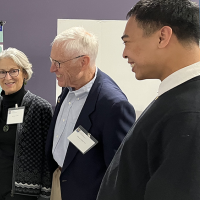Not having enough chairs at a Student Athlete Advisory Committee (SAAC) meeting had never been an issue that advisor Paula Hsieh had to contend with before. But, two years ago, things began to change. Each of the 12 teams in the Gator Athletics program had always been required to send representatives to SAAC, but many more students began voluntarily attending the biweekly meetings, packing the room. While Hsieh suspects that the food that she provides at meetings has something to do with this, she attributes the energy and leadership of the committee’s president, volleyball player Kimberly DeBoer, as the real draw.
“Since Kim became president, the students have taken ownership of SAAC,” says Hsieh. “The executive board has been getting out and talking to other students, and they are working on issues that are important to them.” DeBoer, a sophomore volleyball player, sees her leadership role in SAAC as a tremendous opportunity: “I'm grateful to be a part of and to be able to influence and impact the culture of athletics. Being part of SAAC has shaped my experience.”
The culture change in SAAC is representative of a wider shift that has redefined the ethos of Gator Athletics. Stephanie Shrieve-Hawkins, Director of SF State Athletics since 2018, has devoted herself to creating a “culture of belonging” in the department, with a focus on inclusiveness and achievement rather than competitiveness. While Shrieve-Hawkins values winning, her leadership is defined by a desire for student-athletes to feel positive holistically. “I want students to feel like winners even when they lose on the court, the track, or the field,” she asserts. “I want them to go to bed feeling good about themselves, what they've done, and how they're developing as a person.”
Achieving this goal with students who have been competing since they were children is challenging. According to Shrieve-Hawkins, it is rare that students involved with competition will come forward and ask for help, and it takes caring vigilance to support their mental health. “It’s human nature to be self-critical, to compare ourselves to each other,” says Shrieve-Hawkins. “And we have to recognize it when there’s an issue, and talk to that person and say, ‘Looks like there's something going on. How can we help?’”
For many student-athletes, the stress level is high. In addition to a full academic workload and regular workouts, practices, and competitions, many SF State student-athletes have jobs, families, and other financial and time constraints. While athletes at SF State do not receive full scholarships (unlike those at many other schools), many do receive partial scholarships, which are often funded by private donors. The impact of these funds can be huge, both for individual athletes who struggle to make ends meet and for the teams, which compete with other colleges to retain athletes. For many students, receiving a scholarship also validates their belonging at SF State. “You know that the [coaches and donors] care,” enthuses Sabryn Knight, a sophomore sprinter on SF State’s Cross Country team. “They want you to succeed.”
According to Paula Hsieh, who is the Gator Athletics Academics Coordinator, that success carries over from the playing field to academics. Student-athletes at SF State average high GPAs and graduation rates, on average higher than the general population of students. Sophomore Cross Country runner Olivia Renfro feels that being a student-athlete has taught her time-management skills that allow her to excel on and off the track. She was recently awarded the California Collegiate Athletic Association’s Elite 13 Award, which recognizes the academic and athletic achievement of student-athletes in California. Renfro, whose mother is an alumna of SF State, is the first Gator female to win the award in its history.
SF State Athletics' inclusive culture and support for academic success is a rarity in college athletics and is a draw for many potential students. Sabryn Knight knew Gator Athletics would be a good fit for her after speaking to the team’s coach. Last semester, she decided to transfer from Gonzaga University, a prestigious Division One college where she ran track with her triplet sister. Although she had misgivings about leaving her sister and Gonzaga’s elite program, she feels completely confident in her choice. “I feel so happy and content where I'm at here,” says Knight. “I look forward to going running, and that's something I haven't felt in a long time… It's been such an amazing feeling to feel motivated to feel good, to feel happy, with where I'm at.”




